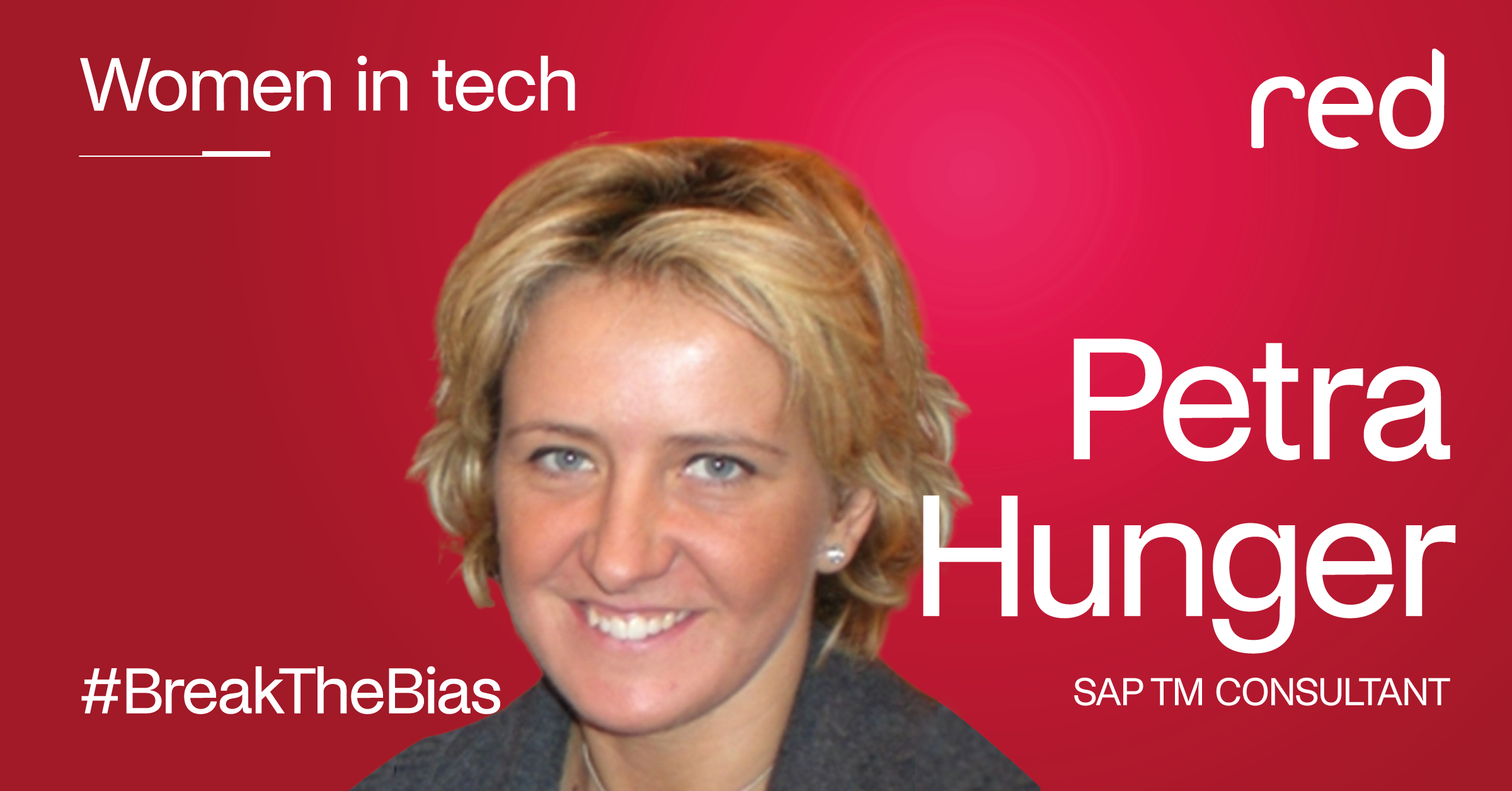Women in Tech | RED Global Q&A session with Petra Hunger
Blog post

In honour of International Women’s Day 2022, we’re hosting a series of interviews with Women in Tech throughout the whole month of March.
We spoke with Petra Hunger, a freelance SAP TM Consultant, from Germany. With over 22 years’ experience in tech, Petra has some interesting insights into the challenges faced by women in tech over the years.
1. Petra, can you tell us what you do in your role on a day-to-day basis?
I analyse companies, help them implement SAP, improve and standardise processes, attend meetings to define the digital way forward for companies. I teach others SAP, develop and document programs. I write specifications for programs, configuration, and assist companies and people in implementing change into their day-to-day work.
2. What’s the most exciting thing about your job?
Meeting smart people from different horizons every day and getting things done within very diverse teams. Learning new things every day and solving various challenges together.
3. Did you always know that working in technology was what you wanted to do?
No, I did not always know that I wanted to go into Tech.
I initially thought that my mathematics skills were not good enough. The first tech role offered to me was far away from my home country, in South Korea and I wanted to travel the world. When the year 2000 came, I grabbed the opportunity to become a freelance after meeting some other freelancers in the SAP world.
4. What are the biggest challenges you’ve faced in your career?
To become a problem solver and really enjoy problem solving. To get along with people who are narrow minded, bureaucratic, or not open to facts. Being asked to implement solutions that I am not convinced they work or are right. Endless meetings without an outcome.
5. Do you feel there is gender bias in the workplace?
It really depends on the company, country and on the individual person that you deal with.
The countries with the least gender bias are France, Denmark, Norway, Ireland and the North of Germany.
6. Have you experienced gender bias? If so, how did you overcome it or how are you managing it?
Yes, I have experienced it, but it is exceptional. I may have experienced that my suggestions were being over challenged. In situations like that, I try to stay calm, be factual and enumerate advantages and disadvantages. That usually works.
Let’s ignore the 1% who are foolish. Most of the bosses and colleagues are intelligent, open-minded, and really great to work with. It can be a big advantage to be a woman in tech. The teams are full of men and studies have proven that diverse teams perform better. The few women that can be found in tech are very hard working and they all produce tremendous results and have great incomes. I see them performing very well on all levels including project management. In my current project, the S/4HANA Project Manager is a young woman of around 25 years of age and of course she is outstanding.
7. What do you think are the biggest obstacles that a woman working in the technology sector faces?
The biggest obstacle is her own belief that she can’t perform, her own discipline to learn new things every day, and to never give up when having to solve a problem and enhance her communication constantly too. There are fantastic intelligent men and women in tech that will enrich every day.
8. Do you feel that women have the same opportunities as men in the tech industry?
Yes. It is a great industry for women to work in. Because companies need tech employees so much, they benefit of more freedom and more money than in other jobs. Go for a job where offer and demand are highly unequal, and they pay you well and treat you well.
9. Why do you think there is a lack of women in the tech industry?
Because tech has been linked too much to mathematics and physics. I think that you can be excellent in tech jobs without studying physics, mathematics or even informatics. In fact, I even think that programming skills are language skills and women have very good language skills.
The second reason: too many young women think that tech jobs mean spending your day in front of the computer. The reality is that tech jobs are all about human interaction: meetings, training and problem solving are all done in teams today and all this requires soft skills: teamwork, empathy, teaching skills, and cooperation.
10. Do you think it is harder for a woman to grow her career and have a personal life? And if so, how can we overcome these challenges?
Yes, it is harder because society expects her, and she wants to spend a lot of time with care work (housework and children). Tech work can be organised around care time if home office is an option and we must not hesitate to delegate housework to cleaning personal. We need nursery and schools to be available and adapted to working parents. We need companies to be more flexible when children are sick. This also means for me: I am flexible, and show understanding and support when a colleague needs it. I am willing to stand in for them. We are the companies. So, we are the change. Last, but not least, we need to share the care work more equally with men. I see lots of men do that in modern companies.
11. How has the industry changed since you’ve started your career?
As it gets harder for companies to find competent employees, I see that they are changing and are more open to working from home and flexible working hours. The basta and macho management times are definitely over. It is not viewed as being competent anymore when one raises their voice. Facts and rational thinking are being valued more and more – at least in the modern, successful companies.12. Have you had any mentors who’ve helped you grow?
In different projects, I have worked with hundreds of different people from everywhere in the world. I have learned from each of them and their specific skills, personalities, and cultural background. I am thankful for the people I have met and the opportunities they have given me. I have also read a lot of books that have helped me grow. My most important mentors certainly are my husband, my parents, and close friends.
12. How has the pandemic influenced your work/life balance?
It was very beneficial for me. I spend more time with my husband, family, and close friends. That’s great! I also spend more time at my home office and less time commuting. I enjoy working with my music on, with my people around me and 6 monitors. At least 30% more work gets done.
13. Do you have any role model women in tech that you would advise young girls start paying attention to?
Sheryl Sandberg
14. What advice would you give to a woman considering a career in tech?
Go for it! You can do it! Great choice! Looking forward to seeing you enrich the digital world.
We are very thankful to Petra for taking the time to do this interview and offering her insights and career advice to women pursuing a career in tech.
Carry on reading our Women in the Workplace Q&A session with Agathe Large, Head of Legal and Compliance at RED Global.
Your Cloud Career Toolkit
Resources
Finding your dream job and navigating your way through a successful career can be challenging.
When it comes to finding a cloud job and dealing with the challenges that may arise in your cloud career, we’ve got the expertise to ensure your success.
In this Cloud Career Toolkit, we'll explore the exciting world of cloud computing and show you how to take the first steps towards a rewarding career in this dynamic field.
If you have any feedback about the toolkit, we'd love to hear from you.
To download our free Cloud Career Toolkit, fill out the form and click 'download'.




.png?r=a0-s768.768-o)
.png?r=a0-s768.768-o)
.png?r=a0-s768.768-o)
(1).png?r=a0-s768.768-o)
.png?r=a0-s768.768-o)
.png?r=a0-s768.768-o)
.png?r=a0-s768.768-o)
.png?r=a0-s768.768-o)
.png?r=a0-s768.768-o)
.png?r=a0-s768.768-o)
.png?r=a0-s768.768-o)
.png?r=a0-s768.768-o)
.png?r=a0-s768.768-o)
.png?r=a0-s768.768-o)
.png?r=a0-s768.768-o)
.png?r=a0-s768.768-o)
.png?r=a0-s768.768-o)
.png?r=a0-s768.768-o)
.png?r=a0-s768.768-o)
.png?r=a0-s768.768-o)
.png?r=a0-s768.768-o)
.png?r=a0-s768.768-o)
.png?r=a0-s768.768-o)
.png?r=a0-s768.768-o)
.png?r=a0-s768.768-o)
.png?r=a0-s768.768-o)
.png?r=a0-s768.768-o)
.png?r=a0-s768.768-o)
.png?r=a0-s768.768-o)
.png?r=a0-s768.768-o)
.png?r=a0-s768.768-o)
.png?r=a0-s768.768-o)
.png?r=a0-s768.768-o)
.png?r=a0-s768.768-o)
.png?r=a0-s768.768-o)
.png?r=a0-s768.768-o)
